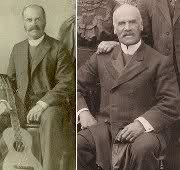While this version is probably the most familiar at this point in history, it is one of many titles of a centuries-old folk song. There are many versions, all of which recount a similar story. A maiden (a young unmarried woman) or man is about to be hanged (in many variants, for unknown reasons) pleads with the hangman, or judge, to wait for the arrival of someone who may bribe him. Typically, the first person (or people) to arrive, who may include the condemned person’s parent or sibling, has brought nothing and often has come to see them hanged. The last person to arrive, often their true love, has brought the gold, silver, or some other valuable to save them. Some of the traditional versions do not resolve the fate of the condemned one way or the other, others have the accused freed from their fate, while others failed in their attempts. As the story started as folktale, often in poetry form or recited as a tale, it has incited many versions that led to ballads and musical adaptations. The most extensive version is not a song at all, but a fairy story titled “The Golden Ball”, collected by Joseph Jacobs in “More English Fairy Tales”. The history of the folktale has been well documented and discussed, as by author Eleanor Long, “”The Maid” and “The Hangman”: Myth and Tradition in a Popular Ballad”.
The earliest recording of the song, called “Gallows Tree”, was released in 1920 by Bentley Ball. In his version the victim is male. Bentley Ball was an itinerant typewriter salesman and song collector who forayed into recording.

On “Led Zeppelin III” the track was credited “Traditional: Arranged by Page and Plant”. For their version Jimmy Page adapted the song from a version by American Fred Gerlach, included on his 1962 album “Twelve-String Guitar” for Folkways Records. Their version followed Gerlach’s very closely for the first two verses (arrival of friends, arrival of the protagonist’s brother), but the lyrics for the second half of the song, detailing the arrival of his sister and her failed attempt to save him, are written by Plant, albeit bearing some similarities to other versions.
Both Gerlach and Page/Plant may very well have been aware and influenced by a 1939 version of the song, then called “Gallis Pole”, recorded by Lead Belly (Huddie Ledbetter). That version also included some spoken narrative describing the events.
Lead Belly recorded several different versions of the song with titles such as “The Maid Freed From The Gallows”, “The Gallis Pole”
and “Mama, Did You Bring Me Any Silver?”
There are many versions of this song. I think the most popular is Huddie Leadbetter’s. I suppose what I sing is an accumulation of all the Gallows Trees and Poles I’ve heard—I’m sure I sing the song because I like the guitar accompaniment. (Ah, modesty, I’ve lost you) I like the song too.
Views: 82